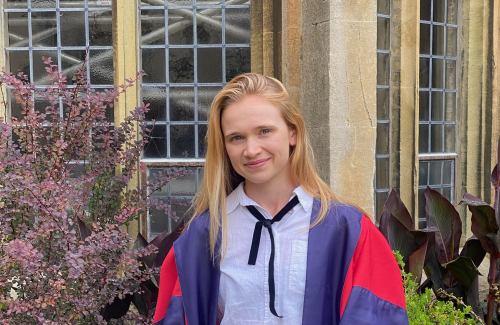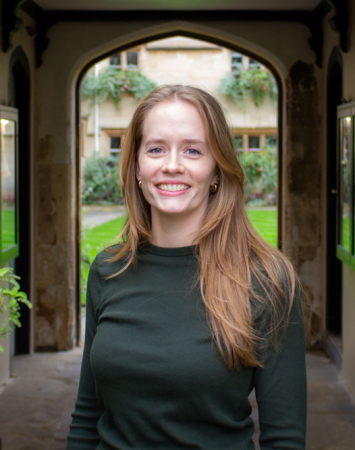Graduate Scholarships & Financial Support
We don't want any student to worry about money whilst at Pembroke. Support funds are available to ensure that every student can engage fully in all aspects of university life, and we are here to help you access support if you need it.
Hear from our Graduates

I am extremely grateful to receive the Tanaka and Tepco Scholarship. This generous support enabled me to pursue my DPhil in Contemporary Japanese Literature and be part of the thriving and stimulating academic community of Pembroke and the wider university.

I am incredibly grateful to have been awarded the Pembroke Alumni Graduate Scholarship. This will allow me to further pursue my research into the use of VR and XR in medical ethics education. It is an honour to be part of such a brilliant academic community.

The Pembroke Alumni Graduate Scholarship is an invaluable resource that enables me to maintain a healthy balance between my academic commitments and living expenses. Thanks to this scholarship, I am able to pursue research in the US on EU and US law.

The Oxford-Farthing Scholarship has given me the invaluable opportunity to pursue my doctoral research, and also given me an amazing opportunity to teach students in three colleges and take on volunteering opportunities.

I am honoured to have been awarded the Julian Schild Scholarship in support of my DPhil in Modern European History. This generous award has been instrumental in advancing my research on art and visual culture in late 20th-century Germany.

This scholarship will allow me to fulfil my academic hunger, writing papers, attending conferences, and pursing my research, without worrying about external financial strain. Pembroke's support is truly valued.

I am tremendously grateful to have been awarded the Charles Hill BCL Scholarship by Pembroke College. Without the Scholarship, I would not have been able to stay at this wonderful academic community for another year.
Graduate Scholarships
A variety of subject specific scholarships are available to graduates each year across a range of courses. Further information can be found below or by emailing Caroline Barnes. Please note - there is no separate application process for our scholarships. We review all relevant course applications (regardless of preferred college choice) applicable to available scholarships.
Scholarships available for 2025 entrants are:
- Jose Gregorio Hernandez Scholarship - for Venezuelan DPhil Medical/Biological Sciences students
Pembroke College offer a scholarship for a student of Venezuelan nationality, with a preference for a DPhil in Biochemistry, Biology or Psychology. The scholarship awards up to £38k per annum.
Atkinson Scholarship - for students from Melbourne University reading DPhil Law, Theology, Medicine or Philosophy
This scholarship award is up to £30k per annum.
Lee Scholarship in Engineering
This award is up to £20k per annum.
Farthing Scholarship in Law
Please see the Law Faculty website for further details.
Percival Stanion Scholarship in Biochemistry
Two fully funded awards will be made in 2025 in conjunction with the department.
If your access to funding changes or you run into financial difficulties while you are on course, there are a variety of funds to help support you.
Dean of Graduates Fund
The Dean of Graduates fund is a small discretionary fund to which applications can be made to help defray the costs of attending conferences, making field trips, or other projects which are essential to a graduate's research. The fund is open for applications and advertised on a termly basis.
Alumni Graduate Scholarships
In addition to a number of subject specific scholarships the College also awards three Alumni Graduate Scholarships worth £4,000 to existing graduate members who require financial aid in order to continue their research. These scholarships provide crucial extra support for graduates completing their DPhils when other funding sources have finished.
Senior Studentships
The College has up to five Senior Studentships tenable each year available to existing graduate members of Pembroke College.
Senior Studentship holders receive an annual stipend above any other awards they may hold; four are worth £600, and one (the Browning Scholarship) is worth £2,000.
In addition, they will become members of the Senior Common Room and have certain dining rights.
The Crystal Clinical Scholarship
The Crystal Clinical Scholarship fund was endowed by Ben Crystal (Law 1998), son of Michael Crystal, QC who lectured in law at Pembroke in the early 1970s, to commemorate the work of his grandfather, Samuel Cyril Crystal, MB, ChB, a general practitioner of medicine in Leeds who was honoured by an OBE for his work.
The £700 fund is available to assist clinical students studying at Pembroke College with the costs associated with their final year elective period and can be used for travel and subsistence.
Travel Prizes
Pembroke has a number of funds providing opportunities for its students to travel during their degree. Awards include, but are not limited to, those listed below, and are advertised at the end of Michaelmas Term for award in Hilary Term. Find travel reports from students here.
Pier Giorgio Frassati Travel Fund
This fund is open to undergraduate and graduate students to assist with travel in the Long Vacation.
Sandrew Travel Fund
The Sandrew Travel Fund is available to non-final year undergraduates and graduates to assist with travel to the United States.
Melandra Castle Trust Prize
This prize is available to graduate students who are completing their second year of study but who are continuing the following year, and can help fund travel of any kind. (Only available every other year.)
Robert Baldick Travel Prize
This fund is open to graduate students undertaking any French related study abroad.
For further details regarding Graduate Scholarships contact the Deputy Academic Registrar, Caroline Barnes. For Travel Prizes contact Martina Stankovianska.
Financial Assistance
To talk confidentially about financial matters once you are on course, please contact the Academic Office. We’re here to help!
Oxford Assistance Fund (OAF)
The Oxford Assistance Fund is provided by the government and is administered and distributed by the University. Application forms are available in College from the Academic Office - please contact Helena Palmer to discuss making an application. The awards are for undergraduate or graduate students experiencing persistent or serious financial difficulty. The maximum award is £8,000 and may be a combination of a grant or a loan.
Find out more about the Oxford Assistance Fund including eligibility and the application process, on the relevant Oxford University webpage.
Pembroke Burt Student Support Fund
Any matriculated undergraduate or graduate student at Pembroke may apply for our Burt Student Support Fund at any stage of your degree. It exists to alleviate financial challenges you may face and ensure you receive support quickly. The Burt Fund can supplement University funds, help with needs not otherwise covered, or provide a faster alternative in urgent cases.
Awards vary by need. Please contact Helena Palmer to apply.
Funding for Students with Disabilities
Enquiries regarding funding for students with disabilities are handled by the Disability Advisory Service. Disabled Student's Allowances (DSAs) are available to all UK students. DSAs are not means tested and are do not need to be repaid. Details are available on the GOV.UK website.
The College has up to five Senior Studentships tenable each year available to existing graduate members of Pembroke College.
Senior Studentship holders receive an annual stipend above any other awards they may hold; four are worth £600, and one (the Browning Scholarship) is worth £2,000. In addition, they will become members of the Senior Common Room and have certain dining rights.

Stephanie Webb
I am a final-year graduate-entry medical student, and a former Wellcome Trust PhD Scholar in Structural and Molecular Biology at the ISMB in London, where I worked with Dr Anthony Roberts. My doctoral research, published in Nature Structural & Molecular Biology, used cryo-electron microscopy and single-molecule imaging to uncover the molecular mechanism of auto-inhibition regulating the kinesin-2 motor protein. A molecular motor integral to anterograde intraflagellar transport within cilia.
In Oxford, I shifted focus from laboratory research to evidence-based medicine. I worked under the supervision of Dr Georgia Richards in the Centre for Evidence-Based Medicine within the Nuffield Department of Primary Care Health Sciences, researching the relationship between chronic pain and mortality using the Preventable Deaths Tracker. Recently, I also worked on projects in collaboration with the UCLH RESPOND team focussing on health services for people seeking asylum.
Alongside my research, I teach anatomy to pre-clinical students in DPAG and have served on the graduate-entry medical school education committee. I aspire to integrate evidence-based research with clinical practice to advance equitable healthcare for vulnerable populations and impact policy within the wider NHS.

Benoit Mes
I am a second-year MPhil student in US History supervised by Prof. Stephen Tuck and Dr. Emily Brady. Broadly, I am interested in histories of anti-racist resistance, racialisation, and mixed-race identity from across the Americas, including transnational, especially transatlantic, connections.
My current research explores the lived experiences of interracial couples, mixed-race children, and multiracial families in the mid to late twentieth century United States. In particular, I look beyond Loving v. Virginia (1967), the US Supreme Court case which ruled that anti-miscegenation laws were unconstitutional, to centre on the changing socio-political landscape that followed the formal end of de jure racial segregation in the late 1960s. Within this context, I explore how interracial couples and their families navigated different settings in spite of an enduring racial binary and persistent legacies of segregation. Equally, I engage questions around how mixed-race children of the ‘Loving Generation’ reckoned with and navigated the US racial binary, considering, for example, the extent to which children born to interracial couples in the generation after Loving formed or engaged with a distinct mixed- or multi- racial identity. Relatedly, I am investigating deliberate efforts to build and foster a distinct multiracial community largely through attempts to bring interracial couples, mixed-race children, and multiracial families together at local, national, and international levels.
Before the MPhil, I completed a BA in History here at Pembroke. Outside of my studies, I am a trustee of and support the work of the Pembroke JCR Art Collection Fund, having led the organisation in my second year of undergrad.

Celeste van Gent
I am a third-year DPhil student in Medieval History, supervised by Dr. Amanda Power and Prof. John Watts. My research explores the religious lives of soldiers in later medieval England. It focuses on how personal religious beliefs and ritual behaviours were shaped by an active life on campaign, with a particular interest in individual practices around healing, protection, and salvation. I use the methodology of lived religion which focuses on the material record and belief as something enacted by ordinary people, rather than as a disembodied intellectual idea. By doing so, my research offers insight into the world of the late medieval soldier as they navigated the fears, thrills, and horrors of war. I am particularly interested in healing charms for wounds, the use of relics for divine favour, and the wearing of cross pendants for divine protection, and the ways in which these objects show the entanglement of the mundane and the transcendent in daily life.
Before my DPhil I completed a Bachelor of Arts in History (Hons) at the University of Sydney where I was awarded the University Medal, and an MSt in Medieval History at St Edmund Hall, Oxford. Beyond my studies, I am currently a Junior Dean at Pembroke, and President of the Oxford University Touch Rugby Club.

Carina Uchida
I am a fourth-year DPhil International Relations candidate, supervised by Prof. Livia Schubiger and Prof. Laura Sjoberg. My doctoral research explores labour strategies, gendered relations and rebel behaviours of armed organisations during civil wars. In particular, I conduct mixed-methods approaches towards understanding social reproduction, care and intimacies during contexts of large-scale political instability. More broadly, I am interested in social reproduction theory, the relationship between care and freedom, and how they are subsumed in conditions of the so-called ‘international’.
At Oxford, I engaged in research with the Oxford Global Security Programme, based at Pembroke College and the Blavatnik School of Government. Under the supervision of Prof. Annette Idler, I conduct qualitative analysis of changes in conflict, with a focus in Somalia, Myanmar and Colombia, and its implications for civilian (in)security and sustainable peace. Currently, I am a Stipendiary Lecturer in Politics and have experience teaching undergraduate papers in International Relations, International Security and Conflict, Politics of Latin America and Feminist Theory. Outside of academia, I am passionate about political education and critical pedagogy, of which I contribute to at Makan, an independent charity committed to intersectional learning.
This is my second time at Oxford, where I previously studied for an MSc in Latin American Studies at St. Antony’s College. Prior, I completed a BA in International Relations at King’s College London. In between, I worked at the International Labour Organization (United Nations) and the Brazilian Ministry of Foreign Affairs (Itamaraty) for several years, where I specialised in labour market analysis for highly feminised sectors, such as the garment, domestic and nursing industries.
Thanks to the generosity of the Horlock Trust, the College has up to three Horlock Studentships, tenable for one year, to award to current graduate students. The studentships are worth £5,000 each and are awarded to current Masters students under the age of 25, with a preference for STEM subjects and a focus on practical activities.

Chloe Harper
I am a third year DPhil student on the Interdisciplinary Bioscience Doctoral Training Partnership (DTP), supervised by Prof. Gail Preston (Department of Biology) and Prof. Stephan Uphoff (Department of Biochemistry). My research investigates a plant-pathogenic bacterium that causes severe disease in economically important crops, with a focus on how it evades plant immunity.
Like humans, plants possess and immune system. One arm of this immunity is the release of antimicrobial compounds that react with pathogen biomolecules to inhibit or kill the pathogen. Over time, however, pathogens have evolved strategies to resist these stresses and continue to cause disease. In my PhD project, I have used bioinformatics approaches, molecular techniques (such as generating mutants and bioreporters), fluorescent microscopy and plant infection experiments to identify novel stress mechanisms in the pathogen. By defining how these mechanisms work, we may ultimately be able to inform novel plant defence strategies.
I am incredibly grateful to receive the Horlock Studentship which will allow me to pursue many opportunities. This support will enable me to attend specialist plant-pathology workshops, present my work at international conferences, and take part in professional development opportunities such as AgTech summits and plant-science hackathons. A massive thank you to the generous donors of the Horlock Studentship!

Emma Simmons
I am a final year medical student on the Graduate-Entry course, with an interest in pursuing surgery. I am very grateful to receive the Horlock Studentship, which opens a lot of opportunities to further explore my interest. This studentship will allow me to undertake a two-month medical elective abroad with a surgical team, which I am hoping to do in orthopaedic or vascular surgery. This elective gives me an amazing opportunity to experience a different healthcare system and spend an extended period with a surgical team. The Horlock Studentship will also allow me to expand my research career. I am working on a systematic review on global maternal suicide with the National Perinatal Epidemiology Unit, and this studentship means I will be able to travel to present my research at conferences.

